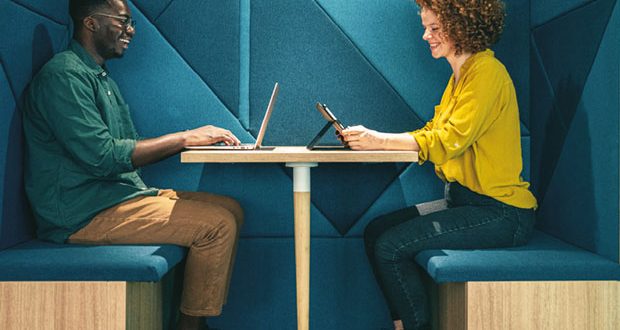There is growing recognition that we all perceive the world differently and that to thrive, we need to create spaces that meet everyone’s needs. However, the concept of inclusive design often conjures up a notion of compromise that curbs creativity and leads to uninspiring solutions.
A new guide from Tarkett ‘Human Conscious Design Principles’ is tackling this misconception and argues that designing with specific needs in mind can, in fact, unlock creativity. That, by interrogating the different ways in which we experience and interpret our surroundings, designers are encouraged to explore new ideas and solutions that they may not otherwise have considered.
It is estimated that one in seven people are neurodivergent and that a staggering 50 million people are living with dementia worldwide, a figure that is expected to triple by 2050.
In the guide, the floor and wall coverings specialist, explores the world through the lens of neurodiversity with the particular needs of individuals with an ADHD, autism and dementia diagnosis in mind.
With an overview of each condition, Human Conscious Design Principles outlines key design considerations across education, the workplace, hospitality and eldercare.
It offers insight into how an individual’s senses can impact their health and wellbeing if an environment isn’t calibrated correctly for them. How certain smells, sounds, colours, patterns, textures and lighting can cause discomfort for anyone, but even more so when dementia or sensory issues are part of their make-up.
Shaz Hawkins, Segment Marketing Manager UK&IE, commented: “Inclusive design sits at the heart of what we do. As one of the leading manufacturers of floor and wall surfaces, it’s our job to ensure that the products we develop are not just technically fit for purpose, but support the wellbeing of the individuals utilising the space, whether that be a school, a hospital, an office, a hotel or a home. This new practical guide gives a voice to individuals with lived-experiences across ADHD, autism and dementia, and highlights some of the challenges they face day-to-day. We hope that it will help designers and end users learn, explore and incorporate new ideas to create more interesting, inspiring and supportive environments for everyone.”
Over the past year, Eptura has used proprietary data and commissioned research to explore how business leaders can balance opposing demands.
In this final summary report on the state of the workplace in 2023, the global worktech leader looks at the key insights that will shape the world of work in 2024 and beyond.
For the Q4 edition of the 2023 Workplace Index, Eptura updated its proprietary data across four demands:
- Freedom and Connection
- Value creation and Cost Control
- Flexibility and Certainty
- CO2 Targets and Costs
To download the report click here.





